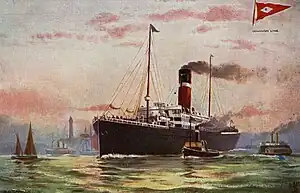 RMS Canada in Dominion Line livery | |
| History | |
|---|---|
| Name | SS Canada |
| Namesake | Canada |
| Builder | Harland and Wolff, Belfast |
| Launched | 14 May 1896[1] |
| In service | 1896 |
| Out of service | 1926 |
| Fate | Broken up in Italy, 1926 |
| General characteristics | |
| Type | Ocean liner |
| Tonnage | 8,806 GRT, 6,016 NRT |
| Displacement | 9,413 long tons (9,564 t) |
| Length | 514 ft (157 m) |
| Beam | 58 ft (18 m) |
| Depth | 38.9 ft (11.9 m) |
| Propulsion | Twin screw, triple expansion engines |
| Speed | 15 knots (28 km/h; 17 mph) |
SS Canada was a British Dominion Line passenger liner remembered as the first twin-screw steamship operating between Liverpool and Montreal. Launched May 14 1896, she was completed on September 26 1896 with sea trials on September 27. She departed on her maiden voyage on October 1 1896, departing Liverpool with a stop at Quebec before arriving in Montreal.[2] She was used as a troopship during the Boer War from November 1899 to Autumn 1902.
In April 1912, Canada's captain had claimed he was in the same ice field as the Titanic, ignored wireless warnings and maintained her full speed. She resumed troop service after the outbreak of World War I from 1914 to 1918.[3]
Her first voyage post-war was November 1918 from Liverpool to Portland, Maine.[4] She was refitted to have 463 Cabin Class and 755 Third Class. [5]In 1921, she was transferred to the Leyland Line of Liverpool, though her name was retained.[6] On September 29 1926, the Canada arrived in Genoa, Italy to be scrapped by L. Pittaluga.
Citations
- ↑ "Launches and Trial Trips: Launch–Irish.: Canada". The Marine Engineer. Vol. 18. June 1896. p. 129. Retrieved 9 June 2020.
- ↑ https://www.ggarchives.com/OceanTravel/ImmigrantShips/Canada.html
- ↑ Emmons, Frederick (1972). The Atlantic Liners. New York: Bonanza Books. p. 32.
- ↑ Haws' Merchant Fleets in Profile
- ↑ https://www.titanicinquiry.org/ships/canada.php
- ↑ http://shippingandshipbuilding.uk/view.php?year_built=&builder=&ref=201988&vessel=CANADA